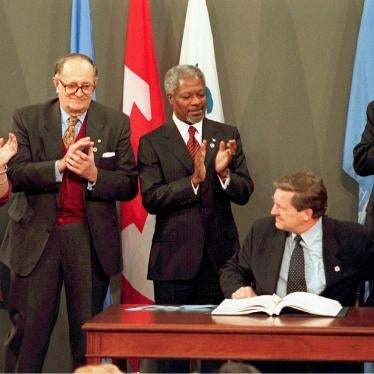Thank you.
We appreciate the opportunity to talk with you today about the status of the CCW Group of Governmental Experts (GGE) on autonomous weapons systems and the latest draft of the GGE chair’s rolling text. I would like present a few of Human Rights Watch’s observations on the text.
Human Rights Watch welcomes the positive developments, which indicate that there is a growing convergence around certain key issues. For example, most notably, the text enumerates a combination of prohibitions and regulations on autonomous weapons systems that provide a framework that could help reduce the systems’ humanitarian impacts. Those provisions recognize the importance of maintaining human control and establishing criteria including predictability, understandability, and limitations of scope.
In addition, the rolling text recognizes the importance of ensuring individual accountability for the use of autonomous weapons systems.
Human Rights Watch believes, however, that there are several areas that would need to be refined before this instrument could adequately address the plethora of concerns raised by autonomous weapons systems.
First, the text should add a prohibition on antipersonnel autonomous weapons systems. Machines that target people dehumanize them and strip them of their dignity and thus should be banned.
With regard to prohibitions, we also support prohibiting development in addition to use, as proposed by the ICRC and others. If development is allowed, there is a risk of proliferation of the weapons systems as well as use of the systems even by normally responsible actors who could get access to them.
Second, Section 1(1) shows there is agreement on the elements of a working definition, but a couple points of concern remain. The paragraph captures that autonomous weapons should both select and engage targets and do so without human intervention. We and many others, however, call for removal of the qualifier “lethal” before “autonomous weapon system.” The term “lethal” is not in IHL and it is unclear in its scope. It is more important to achieve the goals of an instrument than to be limited by the name or mandate of the GGE.
In addition, the phrase “an integrated combination of one or more weapons and technological components” could be dangerously narrowing because it suggests it would only cover systems were all the components were contained in one machine.
Third, the text is focused too narrowly on international humanitarian law. In a couple places, it references “international law, including IHL” making clear that other areas of international law could be relevant, but much of the document focuses more explicitly on IHL. Autonomous weapons systems, however, have serious implications for international human rights law both during armed conflict and in law enforcement operations. International criminal law may also be particularly applicable.
Fourth, while we welcome the text’s recognition of the importance of “human control and judgment,” we have concerns about the specific modifier “context-appropriate.” This term seems too limited because it only applies in certain situations, which leaves too much room for gaps. It would be more effective to use a word that focuses on the nature of the control and judgment and applies in all situations. In addition, international law (IHL and IHRL) already includes rules that would allow for some consideration of context so the addition here is redundant and would serve to restrict action. A more overarching term, akin to meaningful, would be more universal and effective.
In addition to ensuring the text is as strong as possible, states should agree to work to conclude a legally binding instrument. The gravity and global nature of the problem of autonomous weapons system makes such strong and tailored rules imperative.
Achieving effective new law requires collaborative work and an inclusive process in which international organizations, NGOs, and other experts can fully and actively participate to share their experience and offer their inputs.
Thank you.








